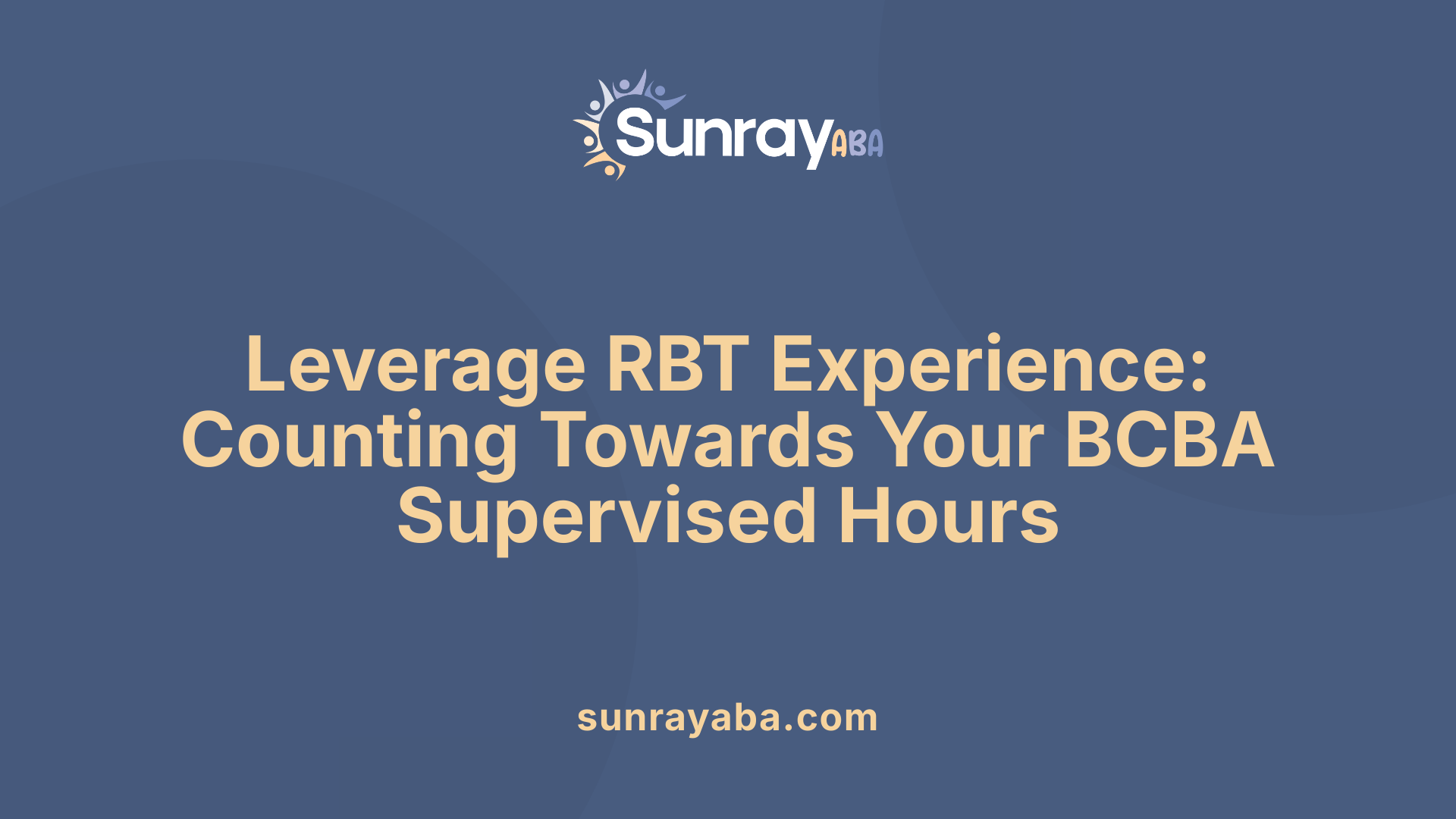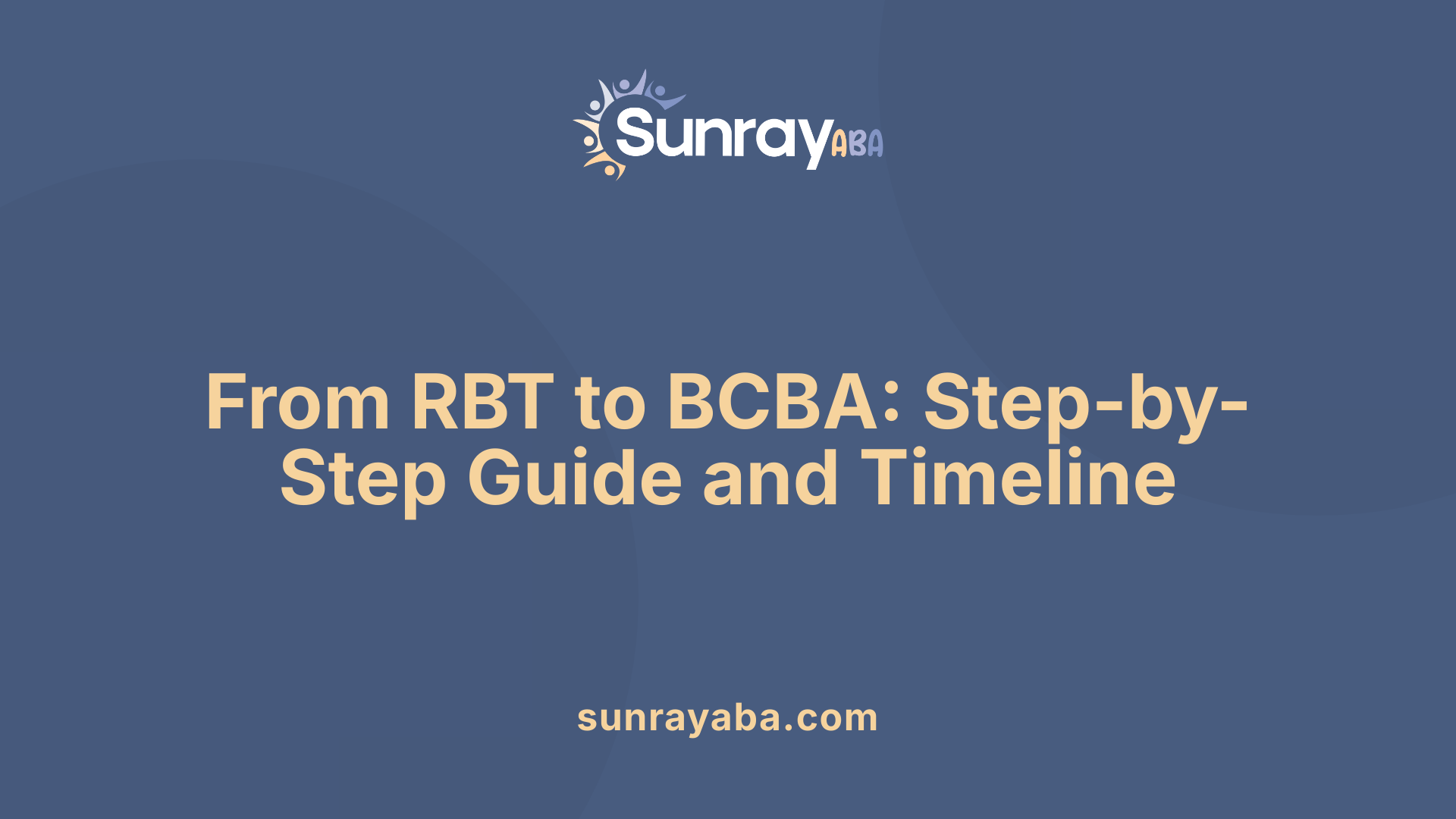Can an RBT Become a BCBA?

Understanding the Journey from RBT to BCBA
Many behavior analysts start their careers as Registered Behavior Technicians (RBTs), a foundational role in applied behavior analysis. While RBTs work under supervision and focus on direct client care, the aspiration to become a Board Certified Behavior Analyst (BCBA) involves a structured pathway that includes education, supervised experience, and certification exams. This article explores the process, requirements, and practical considerations for an RBT aiming to advance to BCBA status, highlighting how supervised fieldwork can count toward certification and what steps are essential to achieve this professional milestone.
Educational Pathways and Prerequisites for BCBA Certification
What are the requirements and steps to become a BCBA from an RBT?
Transitioning from a Registered Behavior Technician (RBT) to a Board Certified Behavior Analyst (BCBA) involves fulfilling several educational and experiential requirements. An RBT interested in this advancement must first obtain a master’s degree in behavior analysis, psychology, education, or a related field from an accredited institution, as mandated by the BACB.
Once the educational prerequisites are met, the candidate is required to complete supervised fieldwork hours. Typically, candidates must accumulate around 1,500 to 2,000 hours of supervised experience. Notably, activities undertaken as an RBT—such as delivering ABA services, data collection, and skill implementation—can sometimes count toward this supervised fieldwork, provided they meet BACB standards and are performed under qualified supervision.
After fulfilling coursework and supervised experience requirements, applicants should submit an application to the BACB. Successful applicants then must pass the BCBA certification exam, a comprehensive test of their knowledge in measurement, assessment, intervention, and ethics, based on the BACB’s Fifth Edition Task List.
Following certification, BCBAs are required to engage in ongoing professional development, including continuing education units (CEUs) every two years, to maintain their certification status. Throughout this process, candidates need to ensure compliance with all BACB policies, including supervision, ethics, and documentation standards.
For an RBT aiming to become a BCBA, careful planning and adherence to the BACB’s guidelines are essential. The pathway emphasizes gaining advanced education, accumulating supervised experience—some of which can overlap with RBT hours—and passing the certification exam, all while maintaining a strong commitment to professional ethics throughout the career.
Supervised Fieldwork: Counting RBT Experience Toward BCBA Requirements

How does supervised fieldwork as an RBT count toward BCBA certification requirements?
Many aspiring BCBAs start their careers as Registered Behavior Technicians (RBTs), a role that provides valuable clinical experience. The hours worked delivering ABA services as an RBT can often be counted towards the supervised fieldwork hours required for BCBA certification.
Supervised fieldwork is an essential component for becoming a BCBA. It involves practical, hands-on experience gained under the supervision of a qualified professional, typically a BCBA or a qualified supervisor. These hours include activities like direct behavior intervention, data collection, and program implementation.
Activities and supervision standards
To qualify, the activities performed during RBT work must align with the standards set by the Behavior Analyst Certification Board (BACB). This includes both restricted activities—such as direct client service delivery—and unrestricted activities, like developing intervention plans or providing supervision to other RBTs.
Supervision must be conducted regularly and include specific elements: observation, feedback, and performance review. The supervisor needs to ensure that the RBT's work meets ethical and professional standards while supporting their development toward independent practice.
The supervision should be provided in real-time, often through face-to-face contacts, with a minimum of two contacts per month—one of which must be individual supervision. This ongoing oversight guarantees that the experience is properly guided and adheres to BACB requirements.
Documentation and record-keeping
Accurately documenting supervised fieldwork hours is critical. Each session should be recorded with details of the activities, supervisor’s credentials, date, and duration. Proper record-keeping ensures that hours can be verified during certification applications.
Multiple supervisors can provide supervision, but maintaining consistency in supervision quality is important. Hours gained in different settings—schools, clinics, homes—are acceptable provided the activities are appropriate and documented correctly.
Moreover, hours spent on activities that are within the RBT’s scope of practice, supervised according to BACB guidelines, can be counted towards the BCBA supervision requirement. This flexibility allows RBTs to accumulate meaningful experience while working toward certification.
In summary, supervised fieldwork hours earned as an RBT are a valuable resource for fulfilling the BCBA certification requirements. Ensuring proper supervision, ethical practice, and meticulous record-keeping helps RBTs leverage their experience effectively to advance toward becoming a licensed behavior analyst.
Can an RBT Transition to a BCBA? Practical Steps and Timeline

Educational requirements
To become a Board Certified Behavior Analyst (BCBA), an individual must fulfill specific academic criteria. This generally includes earning a graduate degree such as a master's or higher in behavior analysis, psychology, education, or a related field from an accredited institution. For RBTs (Registered Behavior Technicians) aiming to advance, acquiring this degree is a fundamental first step. The coursework must cover areas specified by the BACB (Behavior Analyst Certification Board) and often includes specific content hours related to behavior analysis.
Supervised experience
Experience is crucial in the pathway from RBT to BCBA. The BACB requires candidates to complete approximately 2,000 hours of supervised independent fieldwork in behavior analysis. RBTs, already involved in delivering ABA services, can accumulate supervised hours if they meet the program’s criteria. These experience hours must be supervised by a qualified BCBA or BCaBA and documented appropriately. The supervision process involves regular contacts, typically at least two face-to-face meetings per month, with at least one being individual supervision.
Certification exam
After fulfilling academic and supervised experience requirements, candidates can apply to take the BCBA certification exam. This exam consists of 160 multiple-choice questions and is designed to assess knowledge and application of behavior analytic principles. Passing this exam signifies readiness to independently practice as a BCBA and to provide supervision even to other professionals.
Can an RBT become a BCBA, and what steps are involved?
Yes, RBTs can transition to becoming BCBAs, but it involves a clear pathway of education, supervised practical experience, and successful examination. It begins with obtaining a graduate degree in behavior analysis or related fields. Concurrently or subsequently, they must accrue the supervised hours required by the BACB. Once these conditions are met, candidates can sit for the comprehensive BCBA exam. Throughout the process, adherence to ethical standards and ongoing professional development are essential for certification maintenance.
Certification Requirements and Maintenance for BCBAs

What are the certification requirements for becoming a BCBA?
Becoming a Board Certified Behavior Analyst (BCBA) involves several educational and practical steps. Candidates must typically hold a graduate degree in behavior analysis, psychology, education, or a related field from an accredited program that meets the BACB’s coursework standards. Alongside academic qualifications, they need to complete supervised fieldwork that totals 2,000 hours for most pathways, which can include independent fieldwork, practicum within a verified course sequence, or intensive practicum.
The application process requires submission through the BACB, verification of eligibility, and scheduling of the certification exam. The BCBA exam is a four-hour, computer-based test with 160 multiple-choice questions covering areas such as measurement, assessment, skill acquisition, behavior reduction, documentation, and professional conduct.
Candidates must also pass a criminal background check and submit documentation demonstrating their eligibility based on their educational and practical experience. Once certified, BCBAs must maintain their credential through ongoing requirements.
How does the examination process work?
The BCBA examination is a comprehensive test designed to assess knowledge and application skills in behavior analysis. It consists of 160 multiple-choice questions. The test duration is four hours, and the questions are based on the BACB Task List, specifically the Fifth Edition.
Preparation for the exam often involves studying coursework, practical application, and review of professional standards. The exam fee must be paid prior to scheduling, and testing is conducted at designated Pearson VUE testing centers.
Successfully passing the exam confirms the candidate’s competency to practice independently as a behavior analyst and is the final step toward certification.
What are the ongoing obligations to renew and maintain certification?
Maintaining BCBA certification requires ongoing commitment. Certified BCBAs must complete at least 32 Continuing Education Units (CEUs) every two years, including specific ethics and supervision training hours as mandated by the BACB.
In addition to CEUs, BCBAs are required to adhere strictly to the BACB's Professional and Ethical Compliance Code for Behavior Analysts. They must also submit a renewal application along with the associated fee every two years.
Supervision remains a part of certification maintenance, where BCBAs often supervise trainees, including RBTs, BCaBAs, and other BCBAs seeking experience credits. Compliance with supervision standards and proper documentation are vital.
The BACB publishes updates, guidelines, and the BCBA Handbook to ensure practitioners stay informed of the latest requirements and best practices. Certification renewal involves demonstrating ongoing competency and adherence to ethical standards, ensuring that BCBAs continue to deliver high-quality behavior analytic services.
Overview of Pathways and Requirements for Certification and Renewal
| Pathway | Educational Level | Supervised Fieldwork | Exam | Additional Requirements |
|---|---|---|---|---|
| Standard Pathway | Master’s degree or higher | 2,000 hours or more | Yes | Background check, application submission, ethics adherence |
| Limited Pathway (focused) | Concentrated supervised work | 1,500 hours | Yes | Similar eligibility, more focused experience |
| Other Advanced Pathways | Doctoral degree (if applicable) | Varies | Yes | Publications, faculty experience, postdoctoral work |
This table summarizes the main routes to become and stay a certified BCBA, indicating the educational and practical requirements that support ongoing professional development.
Role of Supervision and Ethics in Progression to BCBA

How does supervised fieldwork as an RBT count toward BCBA certification requirements?
Supervised fieldwork hours accumulated while working as an RBT can be credited toward the supervised experience hours needed for BCBA certification, provided certain standards are met. The Behavior Analyst Certification Board (BACB) stipulates that these hours must be supervised properly, involve activities aligned with BACB guidelines, and be well-documented.
Both active client service activities—such as data collection or intervention delivery—and broader tasks like program development can be included in supervised fieldwork, as long as they are appropriate within the supervision framework. Supervision must occur in real-time, and the supervising BCBA or qualified supervisor needs to observe and evaluate performance regularly.
Multiple supervisors are allowed, but consistency in supervision is advised to ensure quality and compliance. Hours can be earned across different settings, which provides flexibility for RBTs gaining diverse practical experience. Accurate record-keeping of supervised hours—including dates, activities, and supervision details—is essential to demonstrate compliance.
Working closely with supervisors to ensure that the hours meet all BACB criteria is critical. Interestingly, hours spent in activities that are both restricted (direct client-focused) and unrestricted (planning and oversight tasks) can often be counted toward the total supervised fieldwork hours if documented correctly. This approach helps RBTs efficiently progress toward the experience requirements needed for BCBA certification.
In summary, RBTs can significantly contribute to their pathway to becoming BCBAs through supervised fieldwork, provided all supervision standards, documentation practices, and ethical guidelines are carefully followed, ensuring a smooth transition from paraprofessional to independent practitioner.
Additional Pathways and Specializations within Behavior Analysis
What are the certification options for those with advanced degrees or specific training?
For professionals with advanced degrees or specialized training, multiple certification pathways in behavior analysis are available. The most prominent is the BCBA (Board Certified Behavior Analyst), which is a graduate-level credential permitting practitioners to work independently and supervise other professionals such as RBTs and BCaBAs.
To qualify as a BCBA, candidates usually need a master's degree in behavior analysis, psychology, education, or a related field from an accredited program. They must also complete a specified amount of supervised fieldwork—generally around 2000 hours—and pass the BCBA examination. This exam comprises 160 multiple-choice questions assessing knowledge across areas like measurement, assessment, skill acquisition, and professional conduct.
In addition to the standard BCBA credential, individuals with doctoral or postdoctoral training can pursue the BCBA-D designation. The BCBA-D reflects doctoral-level expertise in behavior analysis and is awarded to those who have completed an accredited doctoral program, potentially published peer-reviewed research, and met specific postdoctoral experience requirements.
Both pathways significantly expand a professional's scope of practice, allowing for greater involvement in research, training, and higher-level supervisory roles. They also provide opportunities to develop specialized areas within behavior analysis.
The eligibility and pathway options are summarized below:
| Certification Pathway | Educational Requirement | Supervised Experience | Exam Details | Additional Notes |
|---|---|---|---|---|
| Traditional BCBA | Master's degree + coursework | 2,000 hours of supervised fieldwork | 160 questions, 4 hours | Must be accredited coursework |
| BCBA-D (Doctoral) | Doctoral degree in behavior or related field | Postdoctoral experience + supervised fieldwork | Same as BCBA | May involve research publications |
Professionals with advanced degrees and specialized training are well-positioned to excel in behavioral intervention, research, and education. They can also contribute to the growth of the field through innovative practice and scholarly work.
More Information
To explore further, searching for "Specializations and alternative pathways for becoming a BCBA" can provide extensive insights into advanced training, fellowships, and certification options tailored to experience levels and interests.
Balancing Practical Experience and Educational Attainment

How long does the process usually take, and how can an RBT plan accordingly?
Becoming a BCBA is a considerable commitment that typically spans six to eight years. This includes obtaining a bachelor’s degree, completing graduate coursework—often a master’s in behavior analysis, psychology, or education—and accumulating supervised fieldwork hours.
The exact timeline can vary based on several factors, such as an individual’s previous educational background, their availability to complete required experience hours, and how quickly they pass the certification exams. For Registered Behavior Technicians (RBTs) aspiring to become BCBAs, careful planning is essential.
An effective strategy involves setting clear milestones for coursework completion and supervised experience. Many candidates leverage part-time studies or online programs to fit their education around personal and professional commitments.
Supervised fieldwork hours are a critical component and can sometimes be accumulated concurrently with employment as an RBT, provided activities meet the requirements outlined by the Behavior Analyst Certification Board (BACB). Early engagement with supervisors to ensure the hours are appropriate for BCBA prerequisites can streamline progress.
Staying informed about upcoming exam dates, continuing education requirements, and renewal deadlines helps maintain momentum. Regular check-ins with academic advisors or certification support can prevent delays.
In summary, thorough planning, disciplined scheduling, and continuous progress tracking can help RBTs advance toward BCBA certification while managing personal life and employment responsibilities effectively.
Bridging the Gap from RBT to BCBA
Transitioning from an RBT to a BCBA involves a combination of further education, supervised fieldwork, and passing a comprehensive certification exam. While RBT hours and experience can contribute significantly, achieving BCBA certification demands meticulous planning and adherence to BACB standards. The pathway is well-defined but requires dedication, continuous learning, and strategic organization. By understanding the requirements and leveraging prior supervised experience, RBTs can efficiently navigate this professional advancement, ultimately expanding their scope of practice and making a broader impact in the field of behavioral health.
References
- 7 FAQs for RBTs Pursuing BCBA or BCaBA Certification
- ABA Certification Explained: RBT, BCaBA, BCBA, BCBA-D
- How Do I Go From RBT to BCBA? A Guide - All Star ABA
- RBT to BCBA | Autism Resources - Songbird Therapy
- [PDF] registered behavior technician® handbook | bacb
- Board Certified Behavior Analyst
- [PDF] BCBA Handbook - BACB
- FAQs About BACB Supervised Fieldwork Requirements